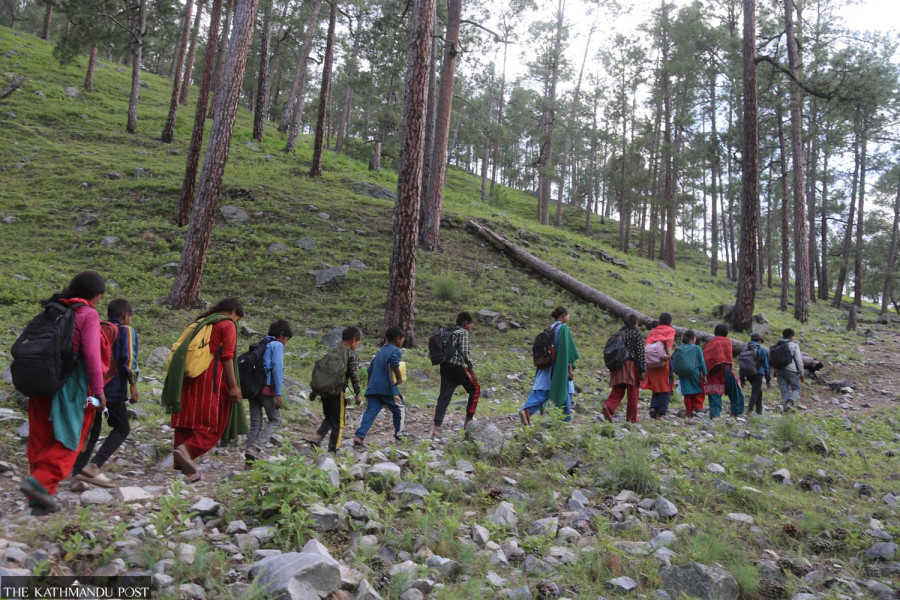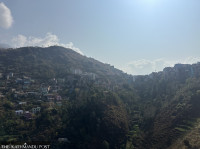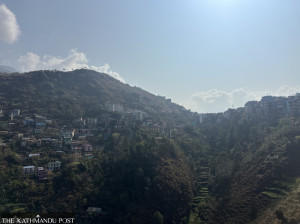Karnali Province
In remote Mugu, children walk four hours to school
Parents say children return home tired. Their Kalika Secondary School in Libru is ill-equipped and understaffed with just 11 teachers for 300 students.
Raj Bahadur Shahi
Dantaraj Nepali, 14, a ninth grader, walks for two hours every day to reach his school, the Kalika Secondary, in Libru, Mugu. To return home after classes, it takes him a three-hour walk uphill. Nepali hails from Musinmela, a remote, underdeveloped village in ward 2 of Soru Rural Municipality where residents struggle to access education and healthcare, among other services. The ward does have a basic school that runs classes up to grade 3, but if one is to continue their studies, they have to make the treacherous trek to Libru daily.
Dantaraj said that he never gets the time to complete the homework due to the stress and fatigue of walking so much. “I usually start walking early in the morning and complete homework after I reach school,” he said.
Almost three dozen students from Musinmela attend Kalika Secondary School in Libru, according to Dantaraj.
“The monsoon season is the hardest,” he said. “The road is prone to landslides so we have to be very careful.” But even that risky trip doesn’t ensure the students a good education, since the Kalika Secondary, established around 46 years ago, lacks adequate means and resources, and is struggling to accommodate the yearly increase in the number of students. The school can accommodate 200 students but currently has around 300 students, while there are only 11 teachers in total, according to Birendra Malla, head of education unit of Soru Rural Municipality.
Dambar Nepali’s two children also attend Kalika Secondary School. He says his children, like the other students from Musinmela village, are burdened with extra weight they have to carry to school. “Besides the textbooks and exercise books, they also have to carry a tiffin box with breakfast and lunch plus a big water bottle,” said Damber. “By the time they return from school, they are too tired to do anything, including their homeworks.”
The parents of Musinmela village spend their days worried about their children, who leave early in the morning to reach school on time.
“We are aware of the risks involved in sending our children to school but what other option do we have?” said Dambar. “We must educate our children so that they can grow up to live good lives and make a living. But on certain days, especially when the weather is bad, worry gets the better of us and we spend all day waiting for their return.”
The school lacks enough classrooms, furniture, computers and even teachers to be able to provide each student with the best education they deserve, said Anga Bahadur Budha, the principal of the school. There is no drinking water at the school, nor does it have a toilet. “We nevertheless try our best so that every student gets a chance to receive a good formal education,” he said.
According to Budha, besides Soru Rural Municipality, parents from Tanjakot and Sarkegad rural municipalities also prefer to send their wards to Kalika Secondary. “There are other secondary schools too but our students secure good marks in board examinations,” said Budha, reasoning the school’s attraction. “The pass rate is at 100 percent.”
Birendra Malla, head of the education unit of Soru Rural Municipality, said that although Kalika Secondary School is doing exceptionally well in regards to providing good education to children, the local unit has not been able to help the school develop infrastructure and add manpower.
In the last fiscal year, the rural municipality spent Rs5 million on the school, but that’s not enough to run the school to its full potential, according to Malla. “The construction cost is very high in this area since it’s in a remote location with no good roads,” he said.
According to Birsana Shahi, a teacher at the Kalika Secondary, due to a lack of physical infrastructure, more than 100 students sit on the floor during their classes. The local unit is yet to respond to the school’s call for help, she said. “While the teachers and the students put in a lot of effort,” Shahi said, “the absence of basic amenities has severely hindered the learning-teaching process.”




 11.53°C Kathmandu
11.53°C Kathmandu.jpg)












